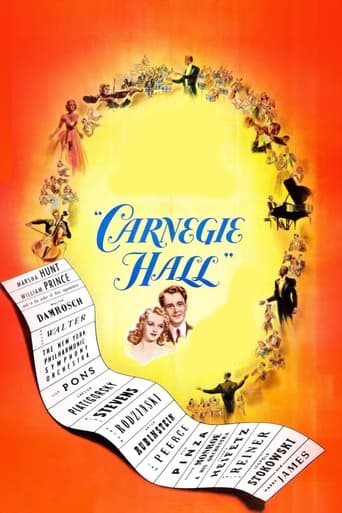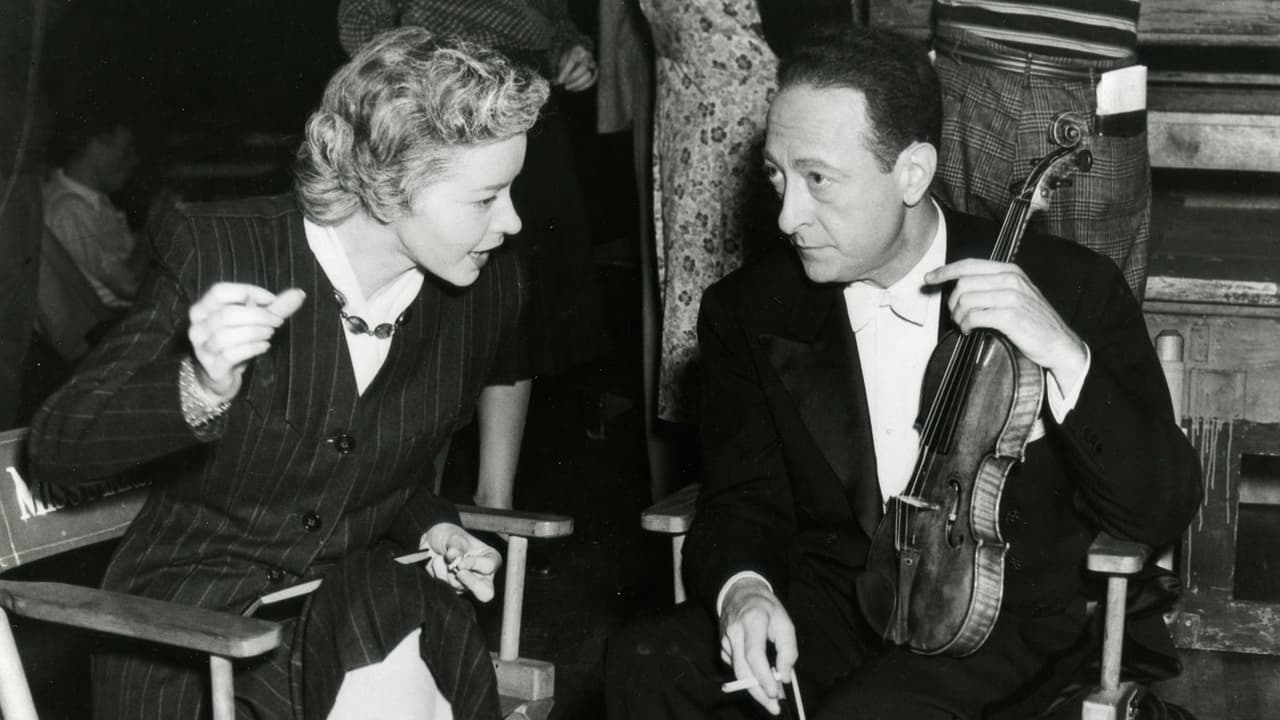clanciai
The meaning of the film gets drowned in the overwhelmingly good performances of the artists, and there are any number of them: they are all there, Artur Rubinstein, Jasha Heifetz, Gregor Piatigorsky, Leopold Stokowski, Bruno Walter, Artur Rodzinski, Fritz Reiner, Ezio Pinza, Lily Pons and even Tchaikovsky (vaguely discerned from some distance, impersonated, of course,) and although Marsha Hunt makes a good and touching performance as the mother who loses first her husband and then her son in the same way - getting lost making their own ways - the superficial acting of that story must drag the film down from the top levels of the performances. The key scene to the whole thing is however Jasha Heifetz' communication with Marsha, when he eloquently comforts her for all her grief better than anyone could have done.The personality of Jasha Heifetz is somehow the key to the whole problem, which is the alienation of the artist from an ordinary human life, which is what both the father and the son can't bear and rebel against. Jasha Heifetz was often considered inhuman in his seemingly callous attitude, and even in his acting here he gives a rather stiff and almost robot-like impression, but his words couldn't be warmer, and they could but come from the heart, which still beats down there under all the layers of superhuman professionalism and completely reconciles Marsha (Nora) with her fate. Edgar G. Ulmer made some very odd films in extremely different directions, there is one film about tuberculosis and another horror film with Boris Karloff and Bela Lugosi, which could be their best - and here he films music, and as a music film of music and about music it will certainly endure for all ages and continue to impress all lovers of real music.
Andrew Schoneberg
I disagree with those here who said the story that frames this showcase for classical musicians is mediocre or worse. Though it's a variation on "the Jazz Singer", I thought the script especially well written, and believably and very likably acted by Marsha Hunt. The scene where her character's adult son finally asserts his independence was so passionately acted by William Prince that I was startled. I didn't suspect that the son was, in real life, older than his "mother"; Marsha Hunt did a fine job playing an older woman.For me, many of the classical music performances were boring, despite the talented and famous cast of musicians. Mostly this was because the un-enhanced 1947 audio did such a poor job of reproducing the music (TCM 2013 showing). I did enjoy seeing Stowkowski conduct in his graceful flamboyant manner (and I suspect that some of the footage may have been rotoscoped for one of the classic Bugs Bunny cartoons, where "Leopold" is the revered symphony conductor). As a musical theater buff, it was interesting seeing Enzio Pinza, near the time when he starred in "South Pacific". He was more charismatic and energetic than in some early 1950's TV footage that was my only visual impression of him.
urbisoler-1
I don't know if any of this constitutes a spoiler or not but better safe than sorry. I saw this film for the first time yesterday (4/9/13). This film is chock full of unbelievably marvelous music. Just one instance: Watch Arthur Rubenstein's left hand piano playing. You won't believe that he could possibly sustain those chords without error. Unbelievable! This film held my attention until the final sequence. The trumpet solo by Harry Kames was well done but the music was unmemorable. It is important to understand the reason for this film. It is not the story line which was mundane. It is the music performed by some of the greatest artists ever. I'm in the process of looking for a copy.
harry-76
What a pleasure it is to review the 1947 "Carnegie Hall," with its wealth of legendary classical artists performing in lengthy segments. Many of these artists have rarely been photographed in such a clear manner, and it is indeed a treat to have so many in one film."Carnegie Hall" contains some 75 minutes of footage featuring these artists, with many works and movements uncut. How rare it is to see and hear such artists as Lily Pons and Ezio Pinza preserved for all time. These, plus many instrumental soloists and orchestras perform brilliantly in beautiful black and white photography.Alas, surrounding these musical segments is a very tepid dramatic yarn, which often is not well blended into the musical sequences. In fact, at one point the drama seems to come to a scretching halt, to make way for the music.Further, the camera work during the first part is rather unimaginative and static. It does get better as the film progresses and, by the end, sequences of Heifitz and Stokowski contain some fluid and interesting shots.While it could have been better, "Carnegie Hall" is a real curio from an era which boasted true musical giants. The restored print is crisp and clear, and the sets are nicely lit, reminding one of the beauty of black and white production.It's worth enduring the story to get to the great music and magnificent artists, all honoring that fine structure at West 57th Street and Seventh Avenue in New York. ###


 AD
AD



